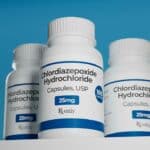Librium withdrawal symptoms may include muscle cramps, insomnia, drug cravings, and severe anxiety. These symptoms may persist for anywhere between 2 days to 8 weeks after the last use.
Librium withdrawal can occur after the body develops a physical dependence on chlordiazepoxide, the main active ingredient in Librium. Dependence can occur after chronic long-term use of Librium.
When a dependent individual is deprived of Librium for several days, they may enter a period of withdrawal.
The unpredictability and severity of Librium withdrawal can be difficult to manage without professional help. A medical detox program, tapering schedule, and enrollment in a substance abuse treatment program can help a person overcome the cycle of drug abuse and withdrawal.
Librium Withdrawal Symptoms
Withdrawal symptoms of Librium can range from mild to severe, and include:
- excessive sweating
- rebound anxiety (returning, intensified feelings of anxiety)
- muscle cramps
- insomnia
- drug cravings
- seizures
- psychosis
Severe withdrawal symptoms may occur if the drug was taken in high doses over a long period of time. Receiving a benzodiazepine prescription for more than one month may not be recommended by doctors.
Patients suffering from chronic anxiety disorders or alcohol withdrawal symptoms may explore other treatment options to lower the risk of benzodiazepine withdrawal.
Librium Withdrawal Timeline
Due to Libriums long half-life, it is a long-acting benzodiazepine. Withdrawal symptoms may take several days to set in, but side effects may last for longer compared to shorter-acting benzodiazepines such as Halcion or Xanax.
Librium withdrawal timelines may vary depending on the dosage and duration of drug use.
Librium withdrawal can begin anywhere between 2 to 7 days after the last dose, and last for up to 8 weeks. Physical and psychological symptoms such as insomnia, cravings, and muscle cramps may persist, recede, and flare up during this time.
Unlike other withdrawal processes, benzodiazepine withdrawal may not worsen over time. Instead, they may fluctuate daily or even hourly, and it can be difficult to predict when symptoms will worsen, improve, or end.
Medical Detox For Librium
A medical detoxification, or detox, program can be the first step in overcoming Librium withdrawal.
During a detox program, medical professionals can closely monitor and manage your withdrawal symptoms, which can be a lower-risk method compared to managing withdrawal on your own.
Patients may be asked to stay at a treatment center during the detox process. This allows for constant monitoring and quick access to healthcare if needed, such as the event of a drop in blood pressure or heart rate.
A successful Librium detox may be accompanied by, and proceeded by, other treatment options.
Tapering From Librium
A medical detox program may be accompanied by a tapering schedule, which involves taking a gradually decreasing dose of benzodiazepines. Compared to quitting cold turkey, a tapering schedule can reduce the severity of Librium withdrawal syndrome.
Patients may stabilize on a fixed dose of chlordiazepoxide for one week before starting a taper. This period of time may be a litmus test for the patient’s health once the taper starts.
After patients stabilize on chlordiazepoxide, they may taper off the drug according to a schedule given by an addiction specialist. Dose reductions may occur a maximum of one week at a time, and adjusted according to the patient’s health.
Substance Use Disorder Treatment
After completing a detox program, patients may be referred to a substance use disorder treatment program. These programs can teach patients healthy coping mechanisms, lifestyle skills, and safer medication practices to improve their long-term outlook.
Treatment options for Librium addiction may include counseling, the use of dietary supplements, and aftercare planning.
Contact Northeast Addictions Treatment Center for an outpatient benzodiazepine addiction treatment program designed for you or your loved one.
Sources
Written by
Northeast Addition Editorial Team
©2024 Northeast Addition Center | All Rights Reserved
This page does not provide medical advice.




